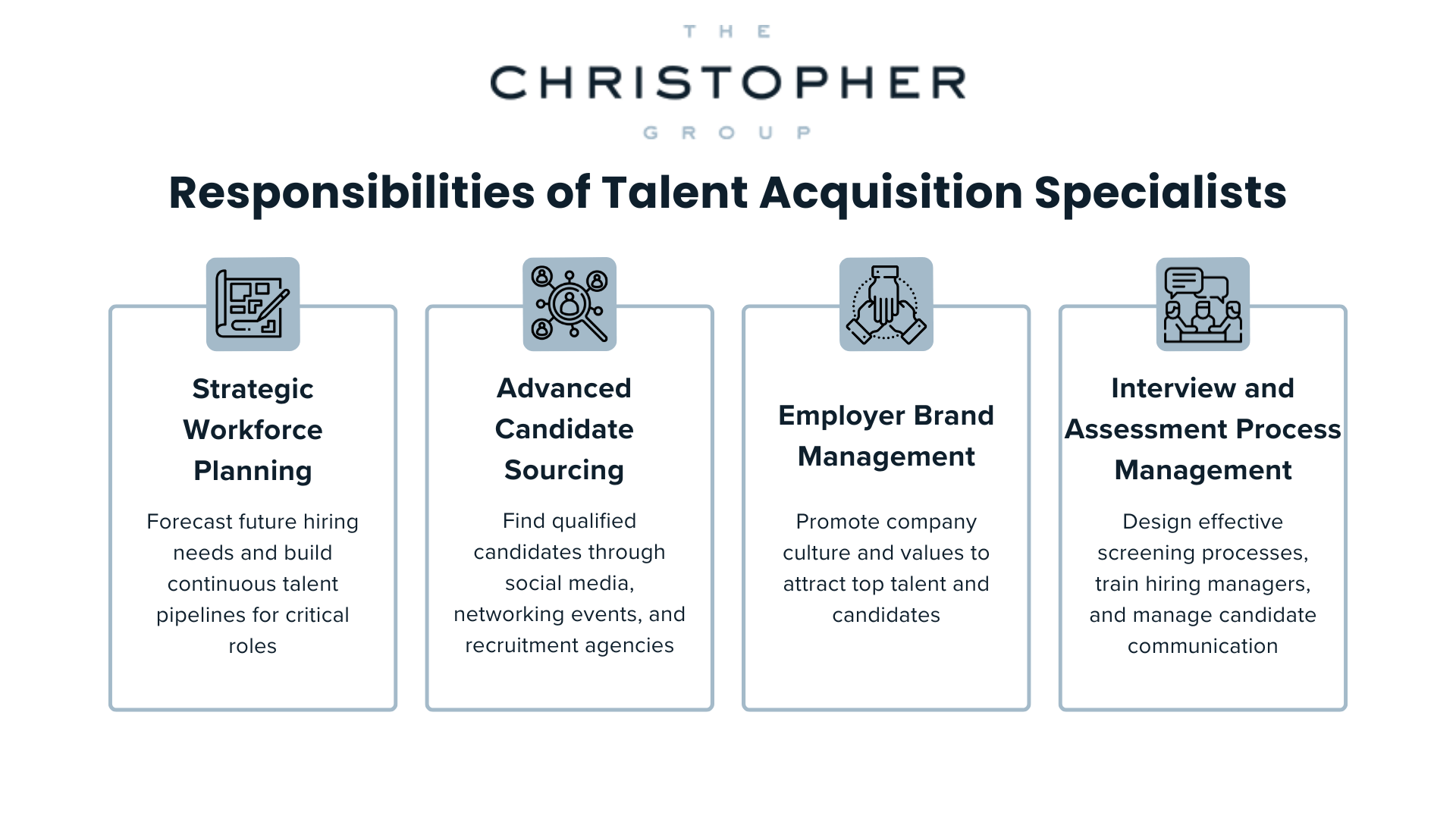In today’s fiercely competitive talent market, finding the right people for the right roles has become more than a transactional process—it’s a strategic priority. At the center of this shift is the Talent Acquisition Specialist: a human resources professional dedicated to developing and executing long-term strategies to identify, attract, and retain top talent.
Unlike traditional recruiters, who often focus on filling open positions quickly, talent acquisition leaders take a holistic and forward-thinking approach. They help companies build strong talent pipelines, create compelling employer brands, and align hiring efforts with business goals. In short, they are essential to modern workforce planning and organizational success.
Why Talent Acquisition Matters Now More Than Ever
The demand for highly qualified candidates continues to outpace supply. Employers are facing rapid technological change, evolving workforce expectations, and increased competition across industries. In this environment, organizations that take a proactive, strategic approach to hiring gain a serious advantage.
Talent acquisition specialists help businesses stay ahead by:
- Anticipating future workforce needs
- Creating talent pipelines to reduce time-to-fill
- Improving the quality of hires through targeted sourcing
- Enhancing employer reputation and candidate experience
The result? Companies are better positioned to grow, innovate, and lead in their industries—thanks to the efforts of a skilled talent acquisition team.
Key Responsibilities of Talent Acquisition Specialists
Talent acquisition specialists wear many hats. Their responsibilities span beyond recruitment alone, often integrating with organizational planning, marketing, and analytics. Here’s a breakdown of their core functions:
Strategic Workforce Planning: At the heart of talent acquisition is strategic workforce planning—the process of identifying current and future hiring needs in alignment with business goals. This involves:
- Collaborating with leadership and department heads to assess talent gaps
- Forecasting hiring needs based on organizational growth, retirements, or new initiatives
- Developing long-term roadmaps to ensure a continuous supply of skilled candidates
- Building and maintaining a strong talent pipeline for critical roles
This proactive approach prevents last-minute scrambles to fill open positions and helps organizations plan for future success.
Advanced Candidate Sourcing: Gone are the days of posting a job and waiting for resumes to roll in. Talent acquisition specialists use a variety of advanced sourcing strategies to engage both active and passive candidates. This includes:
- Leveraging social media platforms like LinkedIn and Facebook
- Using Boolean search techniques and sourcing tools for niche roles
- Attending job fairs, career expos, and university events to reach new talent pools
- Engaging with recruitment agencies and external networks to expand reach
Effective sourcing strategies enable specialists to identify suitable candidates quickly—before competitors do.
Employer Brand Management: Top candidates often have multiple job offers. To stand out, organizations need a compelling employer brand that communicates why they’re a great place to work. Talent acquisition specialists lead the charge by:
- Promoting company culture, values, and employee success stories on social media
- Ensuring job descriptions reflect not only requirements but also growth opportunities
- Optimizing the company’s career page for usability and clarity
- Monitoring online reviews and candidate feedback to protect brand reputation
A well-crafted employer brand attracts top talent and improves the candidate experience, increasing the chances of securing the right hire.
Interview and Assessment Process Management: Creating a seamless and effective interview process is a crucial part of the hiring journey. Talent acquisition specialists are responsible for:
- Designing screening procedures that align with role requirements
- Implementing skills assessments, personality tests, and work samples when appropriate
- Training hiring managers on interview best practices and legal compliance
- Managing candidate communication to ensure clarity and transparency
By refining interview procedures, specialists improve quality of hire while ensuring a consistent and equitable experience for all applicants.
How Talent Acquisition Differs from Traditional Recruiting
Although the terms “recruiting” and “talent acquisition” are often used interchangeably, they reflect two very different approaches to hiring. Traditional recruiting typically focuses on short-term, tactical efforts to fill immediate vacancies, while talent acquisition is a strategic, long-term function aligned with broader business objectives.
Strategic vs. Tactical Approach: Recruiters tend to be reactive—responding to open positions as they arise. Talent acquisition leaders, on the other hand, are proactive. They don’t just focus on the current hiring need; they anticipate future ones. They help organizations:
- Plan for succession in leadership roles
- Respond to market shifts with workforce agility
- Develop evergreen hiring campaigns for high-turnover roles
This forward-looking perspective is what makes talent acquisition a strategic pillar within HR.
Broader Scope of Work: Talent acquisition professionals go beyond sourcing resumes and conducting interviews. Their scope includes:
- Forming strategic partnerships with department leaders to understand evolving team needs
- Participating in organizational planning meetings to align hiring with business goals
- Analyzing labor market trends to understand competitive positioning and salary benchmarks
- Developing diversity hiring strategies and tracking DEI metrics
This broader, more integrated role ensures hiring efforts support the company’s long-term direction.
Enhanced Focus Areas: Unlike recruiters who may work transactionally, talent acquisition specialists focus on building sustainable ecosystems for attracting and engaging candidates. These efforts include:
- Building talent communities by having a database of passive candidates interested in future opportunities
- Leading succession planning initiatives for critical roles
- Conducting competitive intelligence to understand what other companies are offering top candidates
These enhanced focus areas help companies secure a steady stream of qualified candidates while positioning themselves as employers of choice.
Success Metrics That Matter: While recruiters may be measured by volume (how many roles they filled), talent acquisition success is judged by quality and strategic impact. Common performance metrics include:
- Quality of hire: How well new hires perform, stay, and progress within the organization
- Time to fill: How quickly positions are filled from job posting to acceptance
- Cost per hire: The total expense associated with sourcing, assessing, and onboarding new hires
- Candidate satisfaction: Measured through feedback surveys and net promoter scores
These metrics demonstrate how talent acquisition contributes to the bottom line and organizational health.
Talent Acquisition’s Strategic Role in HR
In many companies, the talent acquisition function is no longer a subset of HR—it’s a core driver of business growth. Its integration across departments and leadership levels reflects its increasing importance.
Organizational Integration: To maximize impact, talent acquisition specialists must work closely with other teams and departments. This cross-functional collaboration includes:
- Establishing reporting structures that promote communication between HR, operations, and executive leadership
- Participating in strategic planning conversations to align hiring efforts with company growth initiatives
- Working with learning and development teams to ensure candidates meet the skill demands of future roles
This level of integration enables companies to make talent decisions that support long-term scalability.
Specialized Functions and Project Management: The complexity of today’s hiring landscape has led to specialization within talent acquisition itself. Many organizations now employ:
- Senior talent acquisition specialists who lead executive search and niche recruiting
- Talent acquisition managers who oversee hiring programs and internal teams
- Project-based hiring leads who manage seasonal hiring surges, mergers, or new business units
This layered structure improves efficiency and allows companies to scale hiring efforts with precision.
Technology Enablement: Modern hiring is powered by technology. Talent acquisition leaderss use a range of digital tools to optimize the recruitment process and extract insights from data. These tools include:
- Applicant Tracking Systems (ATS) to manage candidate workflows
- Human Resources Information Systems (HRIS) for integrated reporting
- AI-powered sourcing tools to identify top candidates across various channels
- Analytics dashboards that visualize hiring trends and KPIs
When implemented effectively, these technologies support data-driven decision-making and improve overall hiring outcomes.
Resource Optimization: Another hallmark of talent acquisition is a strong focus on budget stewardship. Specialists are often tasked with:
- Developing efficient recruitment strategies that minimize cost per hire
- Evaluating job board and advertising ROI
- Partnering with recruitment agencies when internal resources are stretched
- Managing vendor contracts and technology investments
This financial oversight ensures the organization maximizes its return on investment (ROI) while maintaining hiring quality.
Partnering with Specialized Talent Acquisition Firms

Given the depth and breadth of the talent acquisition function, many companies choose to partner with specialized firms—particularly for executive hires, confidential searches, or rapid expansion initiatives. These partnerships offer a number of strategic benefits:
Access to Deep Expertise: Specialized firms like The Christopher Group (TCG) bring decades of experience in full-cycle recruiting, from workforce planning to onboarding. Their consultants understand the nuances of industries, hiring trends, and competitive compensation structures—giving clients a head start in finding the best talent.
Expanded Professional Networks: Talent acquisition firms maintain robust databases and cultivated relationships with both active and passive candidates. This allows them to tap into a wider talent pool, often including high-caliber individuals who may not be found through traditional job boards.
Customized Solutions: Firms like TCG offer tailored talent acquisition strategies based on each organization’s unique goals. Whether you need:
- A fractional or interim CHRO
- Assistance in succession planning
- Talent acquisition support during a merger or expansion
Partnering with a dedicated team ensures alignment, agility, and execution at every stage of the process.
Competitive Advantage: In today’s labor market, the organizations that win are those who hire not just quickly, but wisely. With the help of specialized firms, companies are better positioned to:
- Make strategic hires that support long-term growth
- Improve diversity and inclusion through intentional outreach
- Reduce turnover and improve retention through better-fit placements
Ultimately, the right partner transforms your hiring function into a business advantage.
Work with The Christopher Group Today
If your organization is ready to evolve its hiring strategy, The Christopher Group is here to help. As one of the nation’s leading HR executive search and consulting firms, TCG brings deep experience in talent acquisition, leadership development, and HR strategy.
Whether you’re building a team from the ground up, backfilling a crucial leadership role, or designing a more scalable hiring process, TCG offers solutions that align with your needs and values. With Recruiting Directors that specialize in talent acquisition and Managing Partners who have sat in the seats that we hire for, our approach combines high-touch service with high-impact results, helping companies across industries build strong talent pipelines and high-performing teams.
Schedule a Consultation Today: Let TCG help you elevate your hiring process. Contact us today to schedule a consultation and discover how our talent acquisition specialists can help your organization attract, engage, and retain the right people—now and in the future.



